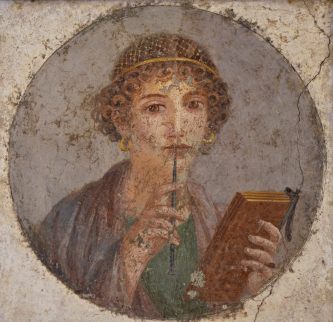
There are two kinds of classicists: the snobs and the proles. I am a snobbish prole, or do I mean a prole snob? For most of my life I have read widely in the canon of ancient literature. Though I do not make my living in classics, I occasionally enjoy a scholarly book such as Sarah Lindheim’s relatively light Mail and Female: Epistolary Narrative and Desire in Ovid’s Heroides.
Classics is not for everybody, yet I am grateful every day for an education by snobbish classics professors who taught not only Latin and Greek but the close reading of literature. Their obsession with grammar, style, figures of speech, and poetic meter blew my little undergraduate mind. And when I was offered a teaching assistantship at the only graduate school I applied to (the application fee of $25 was too expensive!), I was able to teach first-year Latin and Virgil as well as continue my studies.
Though sure of my language skills, I was apprehensive about teaching. My attitude was: You WILL do this, Kat! You HAVE to. And so I did. I was a gifted Latin teacher at the college level. My students enrolled for the language requirement but were hard-working and a pleasure to teach: they ranged from an extremely sweet frat boy (polite, never drunk) to a goofy English major who seemed dazed by the weight of the Complete Shakespeare to two brilliant pre-med students who were by far the best students. All eventually mastered grammar and read the Antiquae Sententiae in Wheelock, which is still a favorite first-year Latin textbook.
Teaching honed my Latin and my confidence. The only adverse effect of such an education on my personality was a certain snobbery, a disdain and pity for those who read the classics only in translation. I do have a strong feeling that classics professors, not English professors, should teach the Classical Lit in Translation classes. It baffles me that English professors can poach Classical Literature in Translation, when the same class is offered by the classics department–and taught by classicists! The particular English professor I’m thinking of dabbled in the Greeks but eschewed Roman literature altogether. O tempora! O mores!

The real gift of my education, though, has been the solace of getting better-acquainted with the ancients through my own reading. This fall I had a literary fling with Cicero, and was extremely touched by his little-known speech, Pro Marcello (In Defense of Marcellus). Friends of M. Marcellus gathered in 46 B.C. in the Senate to ask Julius Caesar to allow Marcellus, who he had fought on the wrong side of the Civil War, to return from self-imposed exile. Cicero, who had also sided with Pompey, argued that Marcellus should be allowed to return safely to Rome as had Cicero and others of similar background.
This speech is as much a eulogy of Caesar as it is a defense of Marcellus. Cicero’s obsequiousness and flattery of Caesar can seem absurd, unless you are, like me, breathing a sigh of relief when Cicero manages not to alienate yet another powerful man and literally keep his head on. He needed to pay court to Caesar in order to help his friend. He tells Caesar that the pardon of Marcellus will be his greatest deed, that brilliant though his war prowess was, his deeds of peace and restoration of civilization would be even greater.
Here is a famous passage from the speech. Bear in mind all these words fit gracefully into two sentences in Latin.
Unless this city is stabilized by by your plans and institutions, your name will merely wander far and wide, and not have a stable place in history. There will be among those who will be born, just as there is among us, a great difference of opinion about your achievements: some will praise your deeds to the sky , others will think they lack some great signifiance, if you have not quenched the flame of civil war with the security of our country. The result of the deeds of war may seem to them the work of fate, but the stability of Rome will be praised as your own design.
Alas, Marcellus was assassinated while he traveled back to Rome. Dangerous times…
